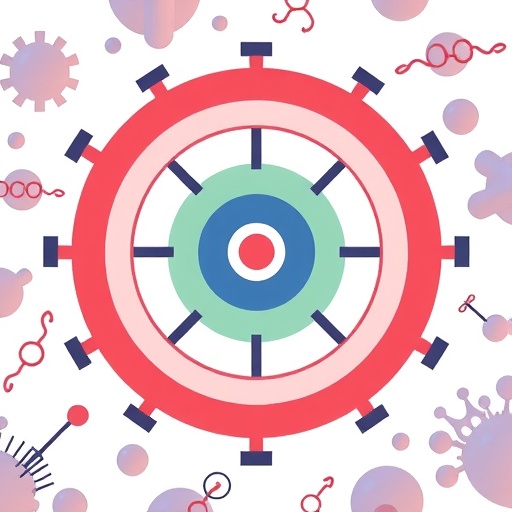Recent research has delved into the intricate world of glucose metabolism, revealing its profound implications in cancer biology and immune regulation. In the seminal article led by researchers Pan, Hsu, and Wu, the authors dissect the complex relationship between glucose metabolism and these two critical areas of human health. Their findings may present new avenues for metabolic targeting, offering hope for future therapeutic interventions.
The authors of this groundbreaking study emphasize that cancer cells exhibit a unique metabolic profile that prioritizes glucose uptake and utilization. This phenomenon, known as the Warburg effect, highlights the preference of cancer cells for glycolysis over oxidative phosphorylation, even in the presence of adequate oxygen. Understanding this metabolic alteration is essential because it not only underscores the inherent differences between malignant and normal cells but also paves the way for targeted therapies that disrupt this glycolytic dependency.
Moreover, the research sheds light on how altered glucose metabolism can also influence immune responses. The role of metabolic pathways in shaping the functionality of immune cells is increasingly recognized, adding another layer of complexity to the relationship between metabolism and disease. For instance, the authors provide evidence that high glucose levels can dampen the immune response, creating a conducive environment for tumor progression. This regulation of immune cells by glucose metabolism presents a potential target for therapeutic modulation and could lead to improved outcomes in cancer treatment.
The findings also highlight the importance of tumor microenvironments. The metabolic state of cells within a tumor can greatly affect the surrounding immune landscape. By studying how glucose metabolism interacts with immune cells, the researchers point to opportunities for combination therapies that can both target cancer cells and modulate the immune response. This dual approach could enhance the efficacy of existing treatments, which often suffer from limitations due to the tumor’s ability to evade the immune system.
Additionally, the article discusses various strategies to exploit glucose metabolism for cancer therapy. One compelling avenue is the use of glucose analogs and other metabolic inhibitors that can selectively target cancer cells. These agents could disrupt the glycolytic pathways that are so critical for tumor growth while sparing normal tissues that do not rely on these pathways to the same extent. This targeted metabolic disruption presents a promising strategy that could improve patient outcomes significantly.
Importantly, the researchers offer insights into the challenges that lie ahead in the quest for metabolic targeting. While the promise of glucose metabolism as a therapeutic target is enticing, there are numerous hurdles, including the potential for resistance and the need to balance efficacy with toxicity. The complexity of metabolic pathways necessitates a comprehensive understanding of metabolic plasticity in tumors, and ongoing research will be vital to navigate these challenges.
As the field progresses, it becomes increasingly clear that a multidisciplinary approach will be essential. The convergence of metabolism, immunology, and cancer biology suggests that collaborations among various scientific disciplines could yield transformative insights and enhance the development of novel interventions. For example, integrating metabolic profiling with immunotherapy could provide a clearer picture of how to manipulate tumor metabolism to favor immune activation.
The implications of this research extend beyond cancer alone. Glucose metabolism plays a vital role in various diseases, and understanding its regulation could have far-reaching effects on public health. Metabolic disorders, such as diabetes and obesity, share overlapping pathways with cancer, and the lessons learned from cancer research could inform strategies for managing these prevalent conditions.
Furthermore, the article encourages researchers to explore the therapeutic potential of dietary interventions. Nutritional modulation may provide an accessible and non-invasive method to impact glucose metabolism and, consequently, both cancer progression and immune regulation. Creating dietary strategies designed to manipulate glucose levels could serve as an adjunct to standard cancer therapies, ultimately leading to improved survival rates.
As research continues to unfold, it will be important to translate laboratory findings into clinical applications. The journey from bench to bedside often involves rigorous testing and validation, and the authors highlight the necessity for clinical trials tailored to evaluate metabolic interventions. Success in this arena could establish a new paradigm in cancer treatment that prioritizes the metabolic profiles of tumors.
In conclusion, the exploration of glucose metabolism as a target for cancer and immune regulation opens up new frontiers in biomedical science. The synergy between diet, metabolism, and immune function is becoming increasingly apparent, marking a shift towards a more integrated understanding of health and disease. As researchers continue to unravel the complexities of glucose metabolism, the potential for novel therapies looms large, promising hope to patients and transforming the landscape of cancer treatment.
Ultimately, the future of cancer therapy may reside in understanding and manipulating metabolic pathways to not only starve tumors but also re-energize the immune system to fight them effectively. As we stand on the brink of a new era in cancer research, the findings of Pan, Hsu, and Wu will undoubtedly inspire further studies that could lead to revolutionary therapeutic strategies.
Subject of Research: The relationship between glucose metabolism, cancer biology, and immune regulation.
Article Title: Glucose metabolism and its direct action in cancer and immune regulation: opportunities and challenges for metabolic targeting.
Article References:
Pan, BS., Hsu, CC., Wu, HE. et al. Glucose metabolism and its direct action in cancer and immune regulation: opportunities and challenges for metabolic targeting.
J Biomed Sci 32, 71 (2025). https://doi.org/10.1186/s12929-025-01167-1
Image Credits: AI Generated
DOI: https://doi.org/10.1186/s12929-025-01167-1
Keywords: Glucose metabolism, cancer, immune regulation, metabolic targeting, Warburg effect, therapeutic strategies.




